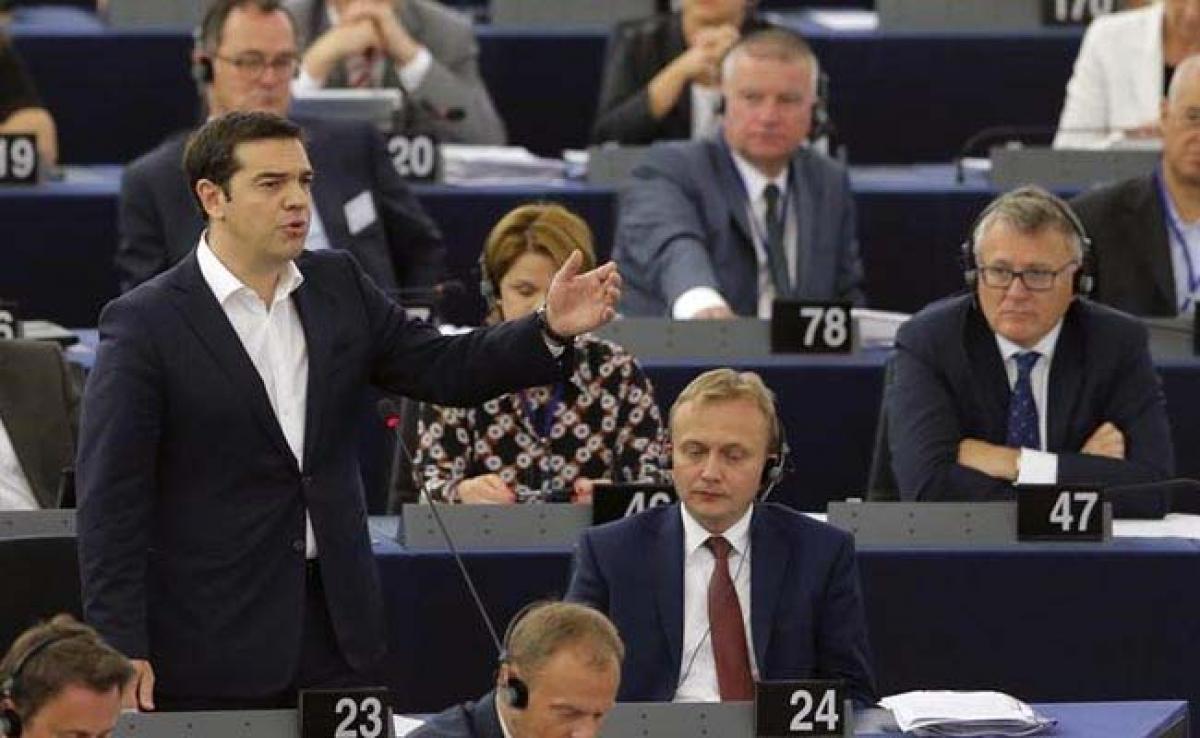Live
- CM Attends Kotideepotsavam on Kartika Purnima
- PKL Season 11: Raiding trio of Devank, Ayan, Sandeep help Patna Pirates rout Bengal Warriorz
- Food waste crisis fuels sustainable practices across APAC food & beverage industry: Report
- AI helps erase racist deed restrictions in California
- ATMIS completes third phase of troops' drawdown in Somalia
- PM Kisan Samman Nidhi scheme bringing smile to Nalanda farmers
- German economy forecast to lag eurozone growth until 2026
- CM Shinde orders stern action against hoarding of onions amid rising prices
- Protest rallies in Manipur against 'mass killing of 10 village volunteers'
- Open Network for Digital Commerce: Tirupati corporation to promote SHG groups products online marketing
Just In

x
Highlights
Greece\'s president formally gave the conservative opposition a chance today to form a new government after leftist Prime Minister Alexis Tsipras resigned, but the country appears almost certain to be heading to an election next month.
Greece's president formally gave the conservative opposition a chance today to form a new government after leftist Prime Minister Alexis Tsipras resigned, but the country appears almost certain to be heading to an election next month.
.jpg)
Tsipras quit on Thursday, hoping to strengthen his hold on power in a snap election after seven months in office in which he fought Greece's creditors for a better bailout deal but had to cave in.
Outgoing Deputy Finance Minister Tryfon Alexiadis said only an election could stabilise Greece after Tsipras's Syriza party split over accepting the onerous terms of Greece's third bailout.
"Elections surely have an indirect cost ... but will clear things up so we can move ahead," he told the state TV channel ERT. "There are political forces which consider the bailout a salvation. Syriza was forced to make this political choice but not because of ideology."
President Prokopis Pavlopoulos had already invited conservative leader Vangelis Meimarakis by email to try to form a new government without the need for a new election, which would be the third in as many years.
He formally received the mandate today morning. But his New Democracy Party has just 76 members in the 300-seat parliament, and is almost certain to fail to find enough partners among an opposition that ranges from the KKE communists to the ultra-right Golden Dawn party.
If Meimarakis has no coalition agreement within three days, the constitution says the next biggest party should be given a chance, but an election is a virtual certainty.
Faced with a near collapse of the Greek financial system which threatened the country's future in the euro, Tsipras was forced to accept the creditors' demands for yet more austerity and economic reform - the very policies he had promised to scrap when he was elected in January.
Announcing his resignation, Tsipras acknowledged his record had been patchy. "I want to be honest with you. We did not achieve the agreement we expected before the January elections," he told the Greek people. "I feel the deep ethical and political responsibility to put to your judgment all I have done, successes and failures."
NO ALTERNATIVE
Under his leadership, Greece had to close the banks for three weeks as panicking savers pulled billions from their accounts, and strict curbs on withdrawals from the banking system remain, badly hurting business.
The economy, which had finally been growing slightly after a long depression, began shrinking again under Tispras, although it bounced back in April-June, according to data that puzzled many economists.
Nevertheless, Tsipras remains popular although no opinion polls have been taken for almost a month, and he appears to have no serious rivals to prevent his return to power.
Tsipras had long been expected to seek early an election in the autumn. But he was forced to move quickly after nearly a third of Syriza lawmakers refused to back the programme in parliament last week, robbing him of his majority.
Across the euro zone, some leading politicians warned Greece to stick to the promises of yet more austerity and economic reform that Tsipras made when he staged a U-turn to secure 86 billion euros ($96 billion) in bailout loans and pull Greece back from the brink of financial collapse.
"The Greeks have no alternative. They know the new package will stop immediately if commitments are not met. Even if a new government was elected it couldn't change anything," said Michael Fuchs, a leading German conservative.
"If the Greeks don't implement the reforms they will no longer receive a euro of aid. It's up to them to decide," Fuchs, who is deputy conservative leader in the German parliament, told Italy's Corriere della Sera newspaper.
Other conservatives tried to draw lessons for their own countries, such as in Spain where the new Podemos party has won wide support with similar anti-austerity policies.
"Populism causes unemployment, poverty and frustration. The failure of Tsipras is the model held up by Podemos," said Pablo Casado, a senior member of the People's Party, on Twitter.

Next Story
More Stories
ADVERTISEMENT
© 2024 Hyderabad Media House Limited/The Hans India. All rights reserved. Powered by hocalwire.com







